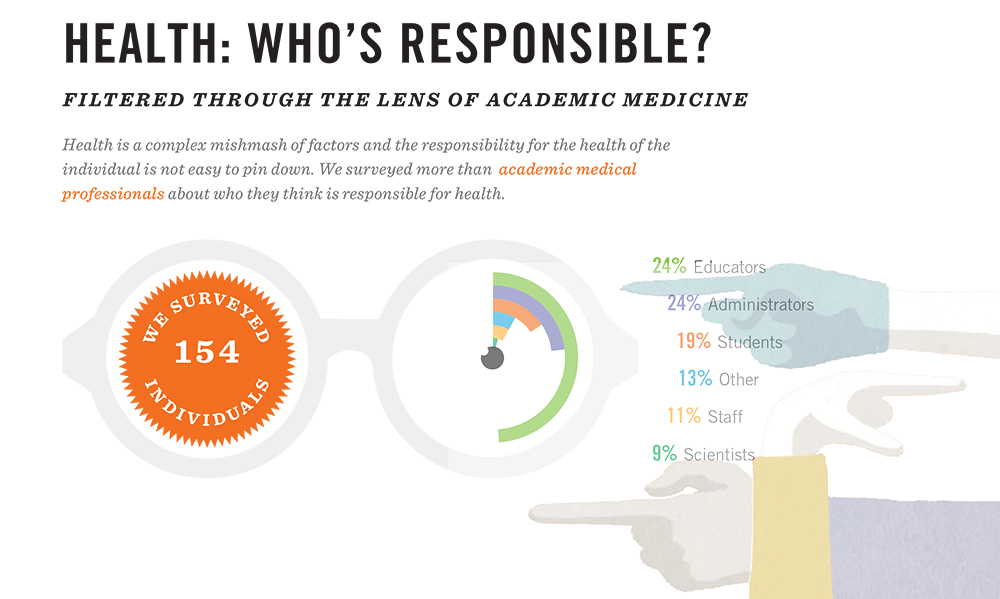Who do health care providers hold accountable for medical outcomes, costs and overall wellness? Depends on whom you ask.
Turns out academic medical center faculty, clinician and student perspectives differ in sometimes significant ways. And those views of American medicine shape how providers care for a country that is struggling to maintain its health. Almost two-thirds of us are obese. One in five of us still smoke. Nearly 2 million of us will be diagnosed with cancer this year. We take more than $425 billion in prescription drugs and spend $3.2 trillion on health care, but, collectively, we still don’t feel well.
 Who’s responsible? We could point fingers at each other all day long. But the simple truth is we’re in this together. So we posed the question “Who’s Responsible for Health?” within University of Utah Health to highlight team members who are thinking about outcomes in a new way, innovating community health partnerships and boosting well-being among their peers.
Who’s responsible? We could point fingers at each other all day long. But the simple truth is we’re in this together. So we posed the question “Who’s Responsible for Health?” within University of Utah Health to highlight team members who are thinking about outcomes in a new way, innovating community health partnerships and boosting well-being among their peers.
To gauge how other academic medical centers answer the question, we surveyed 150 attendees at the annual conference of the Association of American Medical Colleges (AAMC) in Seattle Nov. 11-15 and asked them to tell us what really shapes medical care. The responses were often surprising:
- Nearly two-thirds, 62 percent, said individual patients have the greatest ability to change their health. And most said healthy behaviors — including smart eating and regular exercise and choosing not to smoke — is most influential in shaping a lifetime of wellness.
- At the same time, a whopping 86 percent said providers should not be able to deny care to patients based on their behavior or lifestyle choices.
- Nearly the same proportion, 81 percent, said patients should be interested in guiding their own health care. But just 62 percent said patients are empowered to do so.
- In the end, 42 percent of those surveyed said everyone — government, systems, providers, patients and payors — is responsible for health.
The survey also highlighted a generation gap —or perhaps a shift in medical school curriculum and training — between working physicians and future doctors.
Two-thirds of medical school students believe providers are responsible for knowing how much the procedures and services they’re ordering cost. But the same proportion, 61 percent, of practicing clinicians said health care system administrators are responsible for tracking those costs. Overall, 43 percent of those surveyed said system managers should be monitoring the cost of care; 34 percent said providers are responsible. And just 3 percent said payors (insurance companies) are on the hook for knowing the costs of care and services.
Doctors and students also seem to split in assigning responsibility for the opioid epidemic. Half of the providers surveyed blamed prescribing physicians for the spike in prescription and illicit drug addiction and overdose rates across the country. But students assigned equal blame for the addiction crisis to big pharmaceutical companies that have pushed opioids as a pain remedy.
Finally, when given the choice between treating the sick or keeping people well, 96 percent of students said it is most important to keep patients well, while 69 percent of working physicians agreed.
Read more about who's responsible for health here.
Rebecca Walsh is a Senior Writer for University of Utah Health Sciences.
